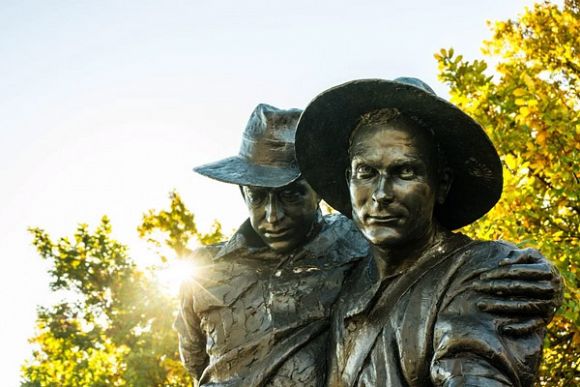When I was a child reading about World War II in Europe I believed that some of its less savoury aspects, particularly informing on others, could never feature in Australia.
I was wrong.
Assuming a colonial heritage of "mateship" and of anti-authoritarianism, "dobbing in" has always been frowned upon. But informing on a neighbour was a common, if now forgotten feature of our wartime society from 1941 to 1945.
As we saw in the early months of 2020, bare supermarket shelves brought out the worst in some people.
During the War, black marketing across the country did not help.
Growing shortages of many everyday goods and some foods gradually became a common feature of the home front from 1940. Not surprisingly, the more enterprising and the criminal elements quickly moved in to exploit this situation.
Their activities highlight an interesting side of the Australian character for as the war dragged on the incidence of citizens reporting on their neighbours and "dobbing in" others they believed were receiving more than their fair share became an increasing phenomenon. Such "moral policing" has taken on new relevance in the face of recent developments in the United States and Britain particularly.
With no end to the War in sight, rationing began to bite. During 1943, encouraged by the Government, correspondence poured in to ministers, members of parliament and police stations alleging illegal activity.
Often anonymous, these letters were extremely detailed, listing details of family and relatives of alleged offenders, military exemptions, travel movements; even the state of the offender’s health.
Undoubtedly many such letters concerning suspicious activities had other motives than the common good, namely envy or malice.
A woman from Mount Barker in South Australia wrote:
During the weekend I heard two women, strangers to me, talking ... "I have only one pair of stockings ... but I shall be set up soon.’ The second woman said ‘How will you?’"
Then came: "A friend in the Services in Canada is sending his wife and me a lovely lot of silk underclothes, night dresses and hosiery and it is quite free of duty if the value of the parcel does not exceed £10 and the goods are on the water now.’"
I considered this disloyal and as so many people have to expend careful thought on using their ration coupons, and rightly so, it seemed unfair that a few could get goods like this ...
Some citizens went further and offered to spy on behalf of the government.
A shearer and staunch Labor Party supporter wrote to Keane:
'If you send a man to make enquiries in a small country town the whole town knows just who he is and one hour after he alights from the train he may put up at a place in this town but he will learn nothing ...
If you are sending anyone to this town in particular on official duty I would be prepared to help him out but if he came here all banners flying I could say nothing ...
There are lots of things I could mention and would like to speak in person to someone in authority.'
Even so, police, postal censors and other authorities struggled to cope with or investigate the sheer number of reports they received from "concerned citizens".
The archives contain many examples of individuals who apparently had no qualms about reporting members of their own family, perhaps to settle scores or to put an end to what they regarded as bad habits.
Ministers and bureaucrats responsible for reigning in black market activities and pursuing prosecutions were usually quick to identify motives.
One mother who wrote that her son boasted he could obtain that all the beer he needed at a cheap price received this reply:
‘Evidently there is some antagonism between yourself and your son in regard to his consumption of alcoholic liquor ... from the list of hotels you supplied it appears likely that your son secures his liquor quite legitimately ...'
At one end of the wartime spectrum, regulations were regularly broken by members of the public because they did not see their actions – small in scale and dictated by short-term needs and opportunities – as illegal or jeopardizing the war effort. It was left to professional gangs or individual criminals, corrupt traders and service personnel to carry out significant black-marketing activities.
But in cities, towns and bush communities even small transgressions were often seized upon and reported.
We generally focus on war and its consequences only on Anzac Day or the 11th of November. Even then, it is the Gallipoli campaign of 1915 that dominates the narrative.
But there is still much to be learnt about our experiences on the home front in both world wars.
Dr Michael Tyquin is a military and social historian and author of A Bit on the Side: Price Fixing, Rationing, Profiteering and Black Markets in Australia and Britain, 1939-1945.
Related Articles
- 1918 HMAT Boonah flu tragedy echoes cruise ship COVID-19 debacle
- The Walers: Our WW1 partners who never made it home
 This work is licensed under a Creative Commons Attribution-NonCommercial-NoDerivs 3.0 Australia License
This work is licensed under a Creative Commons Attribution-NonCommercial-NoDerivs 3.0 Australia License
Support independent journalism Subscribe to IA.
















